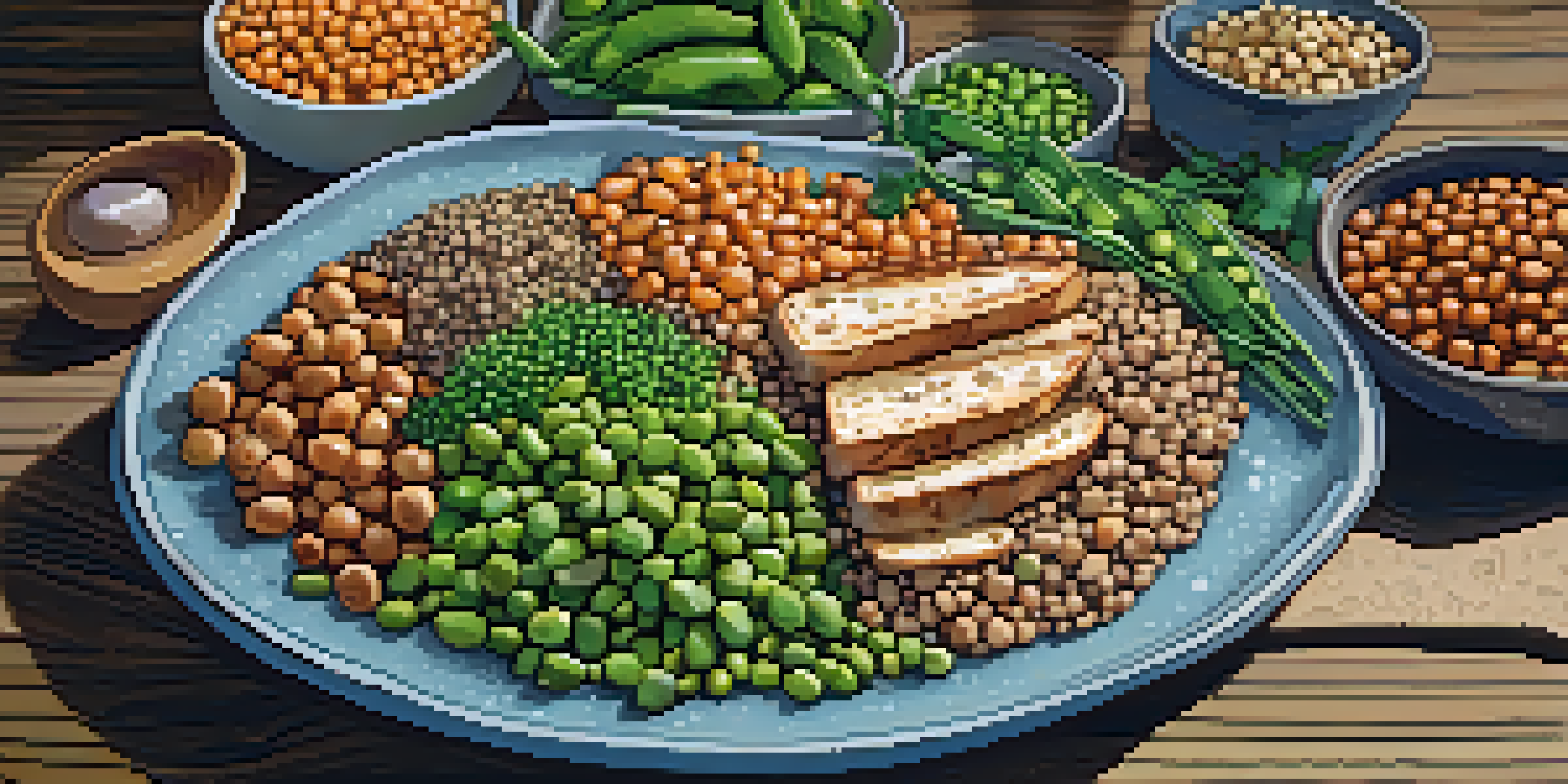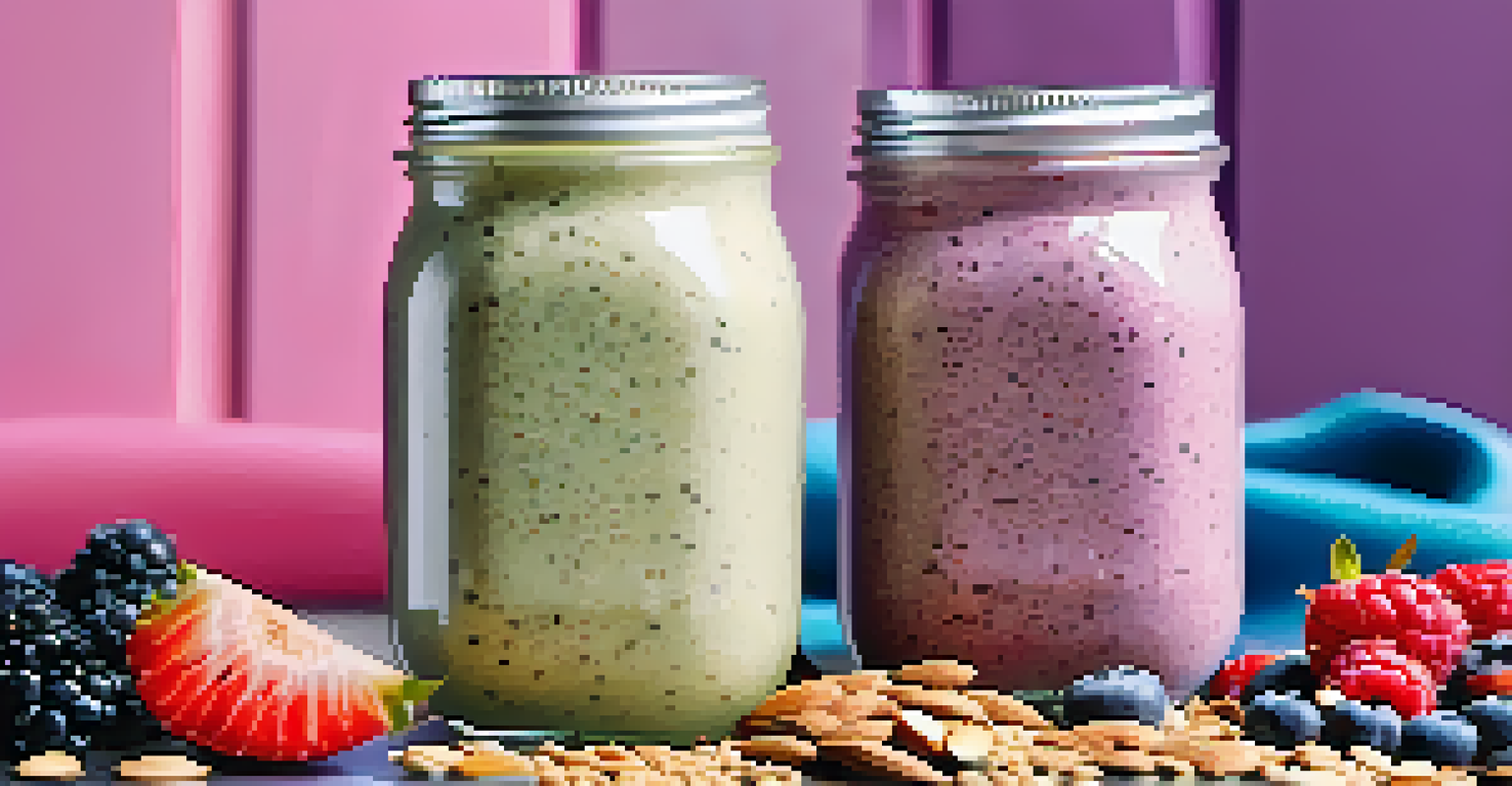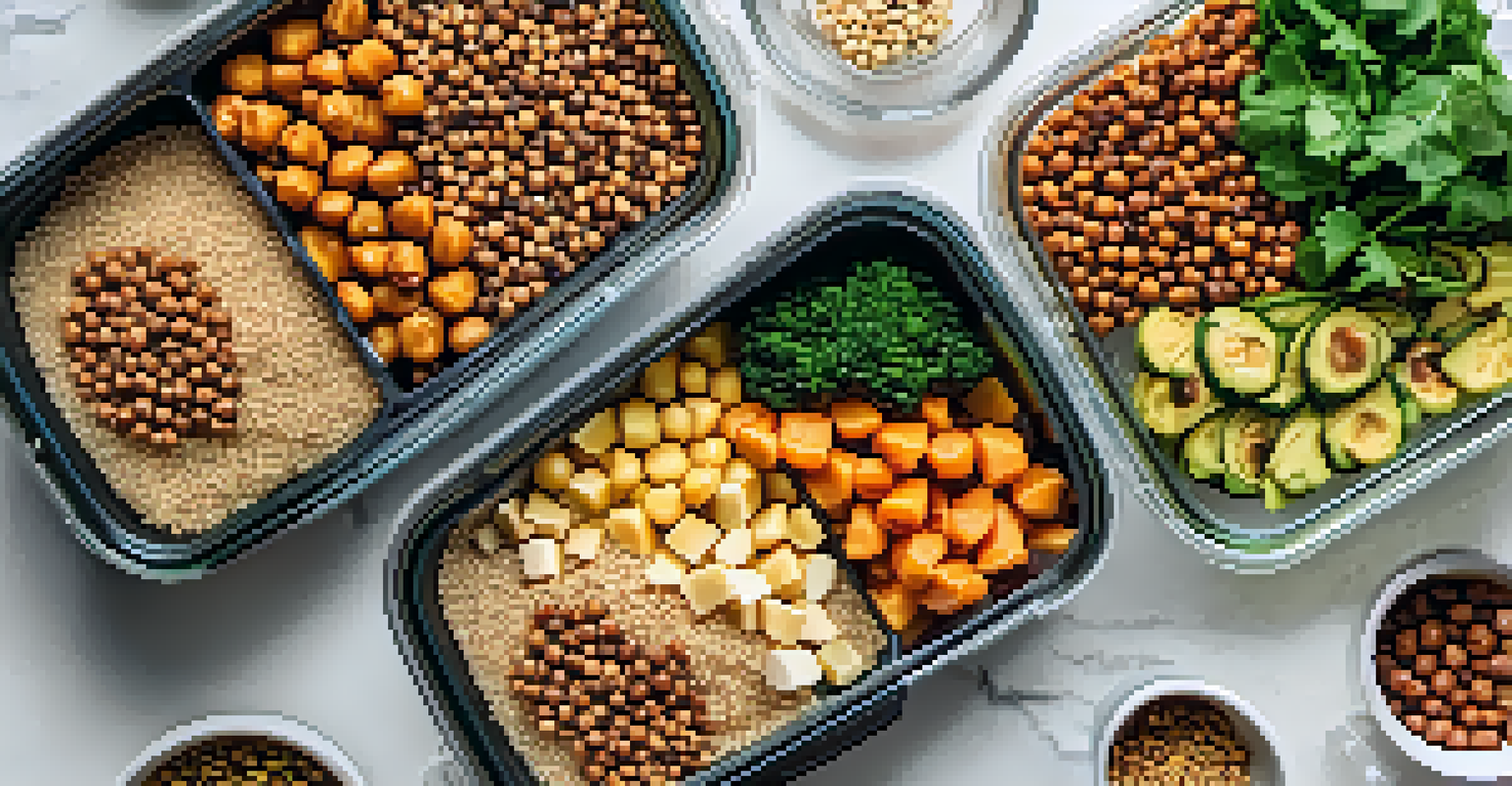Top 10 Plant-Based Protein Sources for Modern Vegetarian Diets

Why Plant-Based Proteins Are Essential for Vegetarians
As more people gravitate toward vegetarian diets, understanding protein sources is crucial. Plant-based proteins not only provide essential amino acids, but they also come packed with vitamins, minerals, and fiber. This makes them perfect for maintaining overall health while adhering to a meat-free lifestyle.
Let food be thy medicine, and medicine be thy food.
Incorporating a variety of these proteins can ensure you meet your nutritional needs without feeling deprived. Without the saturated fats found in some animal proteins, plant-based options can lead to a healthier heart and a lower risk of chronic diseases. Plus, they are often more environmentally friendly, making them a win-win choice!
By exploring these proteins, you can create delicious meals that fuel your body. So, let’s dive into the top sources that can help you thrive on a vegetarian diet.
1. Lentils: The Nutritional Powerhouse
Lentils are a fantastic source of protein, packing about 18 grams per cooked cup. Not only are they rich in protein, but they are also high in fiber, which aids digestion and keeps you feeling full longer. Whether you toss them into soups, salads, or stews, their versatility is unmatched.

What makes lentils even more appealing is their quick cooking time. Unlike some legumes, lentils can be ready in just 20 minutes, making them an excellent option for busy weeknights. Plus, they come in various colors, from green to red, adding a visual appeal to your meals.
Diverse Plant Proteins for Health
A variety of plant-based proteins not only meet nutritional needs but also promote overall health.
Incorporating lentils into your diet not only boosts your protein intake but also enhances your meals with their hearty texture and earthy flavor. They're a staple that every vegetarian should have on hand!
2. Chickpeas: The Versatile Legume
Chickpeas, also known as garbanzo beans, are another stellar plant-based protein source, offering about 15 grams per cooked cup. Their nutty flavor makes them a favorite in dishes like hummus and salads. Moreover, they can be roasted for a crunchy snack, making them incredibly versatile.
You are what you eat, so don’t be fast, cheap, easy, or fake.
Rich in fiber and essential nutrients, chickpeas contribute to heart health and can help maintain stable blood sugar levels. They also serve as a great meat substitute in various recipes, making them ideal for vegetarian burgers or curries.
With chickpeas in your pantry, you can whip up a protein-packed meal in no time. Their adaptability and health benefits make them a must-have in any vegetarian diet.
3. Quinoa: The Complete Protein Grain
Quinoa stands out as one of the few plant-based complete proteins, providing all nine essential amino acids. With approximately 8 grams of protein per cooked cup, it’s an excellent choice for those looking to bolster their protein intake. Its fluffy texture and nutty flavor make it a fantastic base for salads or bowls.
This ancient grain is also gluten-free, making it suitable for those with gluten sensitivities. Packed with fiber, iron, and magnesium, quinoa supports overall health while keeping you satisfied. You can easily substitute it for rice or pasta in your favorite dishes.
Lentils and Chickpeas: Nutritional Stars
Lentils and chickpeas are excellent protein sources, offering essential nutrients and versatility for meals.
Incorporating quinoa into your meals not only enhances your protein intake but also adds a delightful crunch and flavor. It’s a staple that complements any vegetarian plate beautifully.
4. Tofu: The Protein-Rich Soy Sensation
Tofu is perhaps one of the most recognized plant-based protein sources, boasting about 20 grams of protein per cup. Made from soybeans, it absorbs flavors beautifully, making it incredibly adaptable for various recipes. From stir-fries to smoothies, tofu can fit seamlessly into any meal.
Beyond its protein content, tofu is also a good source of calcium and iron, supporting bone health and energy levels. Its soft texture can be blended into creamy sauces, while firmer varieties can be grilled or sautéed for a satisfying bite.
With tofu, the culinary possibilities are endless. Incorporating this protein-rich gem into your diet can elevate your meals and enhance your overall nutrition.
5. Tempeh: Fermented and Fabulous
Tempeh is a fermented soy product that packs a protein punch with about 31 grams per cup. With its firm texture and nutty flavor, it’s an excellent meat alternative for those seeking something heartier. You can marinate it, grill it, or crumble it into stir-fries for added depth.
The fermentation process not only boosts its protein content but also enhances its digestibility and nutritional profile. Tempeh is rich in probiotics, which can promote gut health and improve digestion.
Convenience of Protein Powders
Plant-based protein powders provide a quick and easy way to boost protein intake in busy lifestyles.
Adding tempeh to your diet can provide a unique flavor and texture to your meals while ensuring you get a significant protein boost. It’s a versatile ingredient that deserves a spot in your vegetarian kitchen!
6. Edamame: Snack Your Way to More Protein
Edamame, young soybeans, are a tasty and fun way to increase your protein intake, offering about 17 grams per cup. These vibrant green beans can be enjoyed steamed, sprinkled with sea salt, or tossed into salads and stir-fries. They make for a delightful snack, too!
Beyond just protein, edamame is rich in fiber and essential vitamins, making it a nutrient-dense option. They provide a satisfying crunch and a burst of flavor that can elevate any dish.

Incorporating edamame into your meals is an easy and enjoyable way to boost your protein levels. Whether as a snack or a meal addition, they’re a delightful treat!
7. Nuts and Seeds: Tiny Protein Giants
Nuts and seeds are packed with protein and healthy fats, making them a perfect snack option. Almonds, chia seeds, and pumpkin seeds are just a few examples, providing around 6-8 grams of protein per ounce. They are not only nutritious but also incredibly versatile, great for topping salads, blending into smoothies, or enjoying on their own.
These tiny giants are also rich in antioxidants, vitamins, and minerals that support overall health. Their healthy fats can help improve heart health and reduce inflammation.
Including a variety of nuts and seeds in your diet can add texture and flavor while ensuring you get a good protein boost. They’re a simple, delicious addition to any vegetarian meal plan.
8. Plant-Based Protein Powders: Convenient Nutrition
For those looking for a quick protein boost, plant-based protein powders can be a game changer. These powders, made from sources like pea, hemp, or brown rice, can provide around 20-25 grams of protein per serving. They’re perfect for smoothies, baked goods, or even sprinkled on oatmeal.
Using protein powders can help you meet your daily protein requirements, especially if you’re on the go. They are often fortified with additional vitamins and minerals, making them a convenient option for busy lifestyles.
Incorporating plant-based protein powders into your diet can simplify meal prep while ensuring you get your needed nutrients. It’s an easy way to enhance your vegetarian meals and snacks!